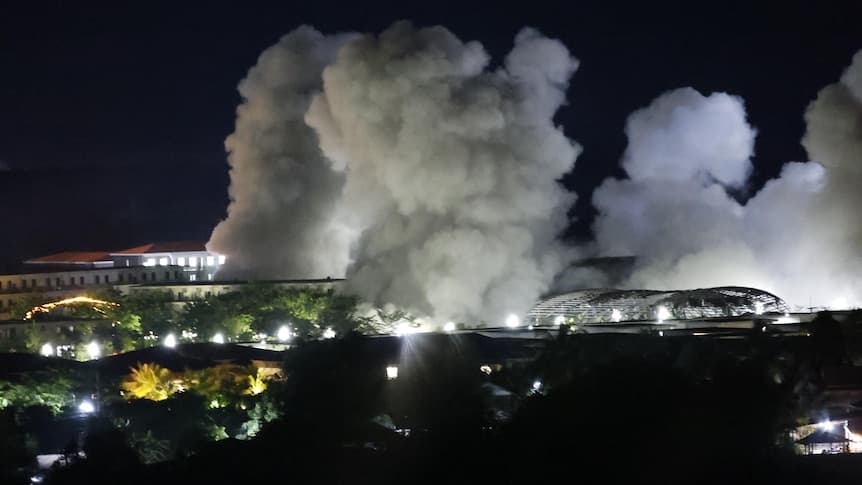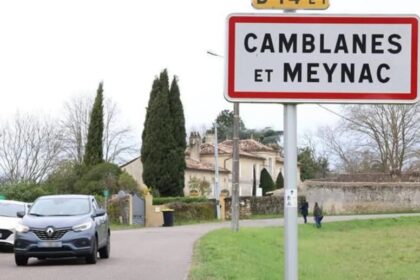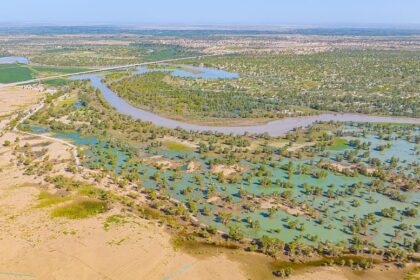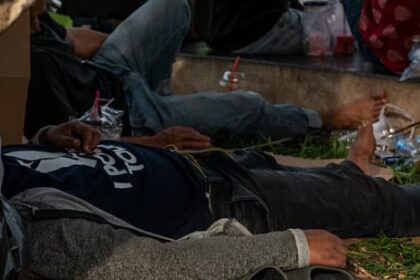Inside a border crackdown that shook Mae Sot and Myawaddy
After sunset on October 24, residents of a Thai village along the Moei River heard a string of explosions from across the water. Myanmar’s military had started bombing KK Park, a sprawling complex outside Myawaddy accused of hosting one of the largest cyber fraud operations on the planet. Over several nights, blasts and secondary detonations sent smoke billowing above the forested banks. Debris fell on the Thai side, damaging houses in Mae Sot. Panic spread in the compounds. Workers began to run.
- Inside a border crackdown that shook Mae Sot and Myawaddy
- How the scam compounds work and why they are hard to kill
- Who profits and who pulls the strings
- Arrests, demolitions and what the numbers show
- Victims, willing workers and the gray area
- Regional pushback and the legal fight
- What could curb the trade
- What to Know
In the following days, more than 1,500 people escaped across the shallow river into Thailand. Some floated on foam boxes, others waded with bags over their heads. Thai soldiers and border police ushered them into makeshift shelters for questioning and health checks. They carried passports from at least 28 countries. Many were Indians, Chinese and Filipinos. Others came from Vietnam, Pakistan and African nations such as Ethiopia and Kenya. Thai authorities screened arrivals to decide who had been trafficked and who had crossed illegally for work. A handful died in the attempt to flee.
KK Park became a symbol of a vast criminal economy that has taken root along a remote frontier. Along the 2,400 kilometer border between Myanmar and Thailand, more than 40 fortified compounds run online swindles that target victims worldwide. The scams generate billions of dollars a year. They are entangled with money laundering, illegal gambling and networks that recruit and transport labor under threat. UN researchers estimated in 2023 that at least 120,000 people in Myanmar are trapped in scam work after false job offers. Thai police and Chinese officials believe that 50,000 to 100,000 people still work in the hubs around Myawaddy alone.
Even as Myanmar’s generals announce arrests and show images of buildings blown up, the business keeps going. Analysts who study the syndicates say KK Park may have held 25,000 workers at its peak. Removing a few thousand people from the border towns weakens visible hubs for a time. It does not take down the networks that hire, move and exploit the labor. Compounds shift personnel inland, add new buildings away from main roads or migrate across borders when pressure rises. The work phones and scripts keep rolling.
How the scam compounds work and why they are hard to kill
From the outside, the largest compounds look like technology parks. KK Park covers hundreds of hectares. It has dorms, villas, restaurants, a clinic and even a bank. Inside the walls, rows of call rooms and open offices are filled with teams who run investment cons, romance hoaxes and fake crypto plays. The most common tactic is called pig butchering. Recruiters hide behind attractive profiles on chat apps, build trust with a target over weeks, then shepherd the person into a slick looking trading platform that drains deposits into accounts controlled by the gang.
Workers who try to leave often face fines or beatings. Accounts from people who escaped describe punishment with electric batons, forced overtime and resale from one operator to another inside the same town. Companies reward top earners with bonuses and perks. Those who fall short risk violence. Guards restrict movement and take passports. Security cameras cover every corridor. Watchtowers and fences surround the perimeter.
Connectivity is the lifeblood of the scam floors. When Thai authorities cut power lines and internet services that crossed the border, the compounds turned to satellite internet. Thai police say they intercepted shipments of Starlink terminals bound for the sites. Myanmar troops later seized dozens of terminals during raids. Space companies say they have disabled thousands of units near suspected scam hubs. The complexes added satellite dishes on rooftops to keep the messages flowing when wires went dark.
One survivor from the Philippines, who said she was lured by an online job ad that promised a customer service role, recalled daily quotas and threats. She asked that her name be withheld for safety.
“Every day I had to message hundreds of people. If I missed targets they slapped me and shocked me. When I begged to quit, they sold me to another team and raised the debt they said I owed.”
This mix of polish and coercion makes the compounds resilient. They are built to function like closed cities, with food supplies, housing and their own network access. That set up lets operators resume activity quickly even after a raid.
Who profits and who pulls the strings
The scam economy on Myanmar’s borders did not appear by accident. It grew inside a war zone where the central state and ethnic forces compete for territory and revenue. After the 2021 coup, the military increasingly relied on allied militias and business clans to hold ground. Local power brokers licensed criminal ventures in exchange for cash, jobs and a cut of the proceeds. On the Thai frontier this had a visible result. Large compounds with Chinese investors and managers opened in ceasefire areas or in territories overseen by groups aligned with the army.
The military denies any role in protecting the crime sites and has blamed the Karen National Union and other ethnic forces. A senior spokesman has said leaders of the Karen group were involved in scam projects around Myawaddy. Researchers counter that the largest centers tend to sit in zones where militia partners of the army or groups under ceasefire operate without obstruction. Western governments have sanctioned a roster of operators tied to compounds in Myanmar and Cambodia.
Jason Tower, an analyst who has tracked the industry for years, says headline raids have yet to target the financiers and protection rackets that make the model work. He argues that partial demolitions and public arrests are designed to satisfy foreign pressure while preserving the business relationships that feed the state and its friends.
In an interview this month, he put it bluntly.
“The crackdown is political theatre. The military controls the compounds, and there is no real effort to prosecute the people who run them.”
Evidence on the ground supports that view. While troops have detained thousands and seized equipment, operators often shift to a new building nearby. Countrywide, removing ten thousand workers has barely dented a labor force that runs into six figures. The result is churn, not closure.
Arrests, demolitions and what the numbers show
State media in Myanmar said soldiers raided KK Park in October and detained more than two thousand people. Officials listed 148 buildings inside the complex, from dormitories to a gym and a karaoke hall. They say more than one hundred have been demolished and the rest are being prepared for demolition. Troops displayed stacks of satellite devices, phones and computers. Thai units on the river reported that explosions continued for days as demolition crews set charges.
Satellite images reviewed by independent analysts show a more modest level of damage. Photos taken after the raids reveal that roughly a quarter of the site appears destroyed or damaged, while large central areas built up in recent months look intact. Fences and gates still ring much of the property. Nearby, other compounds have expanded, adding docks and new warehouses along the river.
At the border crossing points the human flow tells its own story. Thai officials say more than one thousand people crossed into Mae Sot over a span of three days during the peak of the exodus. Thailand has removed more than five thousand people from scam hubs since February and helped send over three thousand back to their home countries. Chinese, Indian and Filipino nationals are among the largest groups. Many more wait in shelters for documents and flights.
Major General Zaw Min Tun, the Myanmar military spokesman, has cast the operations as a necessary law and order push against criminal syndicates. He has also accused Karen leaders of involvement. Human rights groups and regional researchers point to the limits of that campaign, which leaves major operators intact while hitting select buildings and low level staff.
Victims, willing workers and the gray area
The border operations have reignited a difficult debate. Who inside the compounds is a victim and who is a participant in crime. Thai investigators say early interviews suggest that hundreds of people went to Myawaddy voluntarily seeking better pay, only to find themselves locked into scamming work later. Others arrived for jobs in online gambling or tech support and were moved onto fraud teams by force.
Thai Police General Thatchai Pitaneelaboot, who leads operations around Mae Sot, has asked colleagues in multiple countries to help sort the cases with care. He wants to identify genuine victims for support and criminal suspects for prosecution, then speed repatriation so local units can keep pressure on the hubs.
His message is direct.
“We need careful investigations to distinguish criminals from victims, and we need to move people home quickly so we can keep pushing on the gangs,” he said.
India has flown home hundreds of its citizens who fled from KK Park and nearby compounds. One air force flight carried 270 people and more followed days later. In total, about 465 Indians were repatriated from Mae Sot during that week. More flights have since brought back nearly two hundred others who surfaced after the first raids. Returnees are being questioned about recruiters and handlers, and many will receive support as trafficking victims.
The profiles are diverse. University graduates from Asia and Africa were promised customer service roles in Thailand. Skilled tech workers were lured by offers of high salaries, housing and visas. Some arrived in Thailand on visa free entry, then were shuttled across the river at night. Identity documents were taken away. The first weeks often brought long shifts and fines for small mistakes. The following weeks brought threats if they refused to message new targets.
Regional pushback and the legal fight
Governments in the region are trying new tools to disrupt the trade. Thailand has cut electricity, fuel and internet links that had quietly fed compounds on the Myanmar side. Police have seized satellite terminals at checkpoints and at border warehouses. Space firms say they disabled more than two thousand satellite devices around suspected sites after they learned of misuse.
China has pushed hard for action as more of its citizens are victimized. Chinese officials coordinated with Thai police after the kidnapping of a Chinese actor in January, an incident that made the scam hubs a trending topic on social media. Since then tens of thousands of Chinese nationals linked to the centers have been repatriated from Myanmar, either as suspects or as workers removed from compounds.
Legal cases are starting to reach the courts as well. In Thailand, judges have approved the extradition of She Zhijiang, a Chinese businessman accused of running large fraud and trafficking operations from Myanmar border towns. The United States, Canada and the United Kingdom have imposed coordinated sanctions on companies and individuals that enable the centers. Investigators have also tried to follow the money. United States agents have seized millions of dollars worth of cryptocurrency tied to romance and investment scams, and they are tracing funds across payment service providers and offshore banks.
These efforts have created friction for the gangs. They have also triggered adaptation. Operators move people into Laos or Cambodia for a time, then return to Myanmar when local pressure eases. Some build deeper inside Karen State to avoid easy surveillance from across the river. Others fragment their teams into smaller sites and move equipment often. Arrests at one site create a vacancy that is quickly filled elsewhere.
What could curb the trade
A lasting reduction will likely take sustained pressure on people and money at the same time. The first piece is protection for workers so they can come forward without fear. That means temporary shelters, quick processing, and a clear route home for people who were trafficked. It also means fair trials for those who actually ran scams or abused workers.
The second piece is to starve the centers of cash and communications. Telecom and satellite providers can tighten compliance, track suspicious clusters of terminals and shut service where there is clear evidence of misuse. Payment companies and crypto exchanges can expand know your customer checks, flag pig butchering patterns fast and block transfers tied to the known platforms. Banks in the region can share data on mule accounts and frequent withdrawals. Public warnings about fake job offers need to reach young job seekers in India, China, the Philippines, Vietnam and beyond.
Finally, enforcement needs to focus on the people who sit above the floor bosses. The financiers, recruiters, transporters and the security patrons who take a cut of profits are the ones who enable the business. Targeted sanctions, asset freezes and joint investigations that include Myanmar’s neighbors can raise the cost for those actors. Without that focus, public demolitions on the border will keep generating headlines while the scam scripts and money trails continue elsewhere.
What to Know
- Myanmar bombed parts of KK Park near Myawaddy after October 24, sending more than 1,500 people fleeing into Thailand. Debris damaged houses in Mae Sot and some people died crossing the river.
- Thai officials processed arrivals from at least 28 countries. During the peak, more than 1,000 people crossed in three days.
- State media reported 2,198 arrests at KK Park and plans to demolish 148 buildings. Satellite images indicate about a quarter of the complex was destroyed or damaged.
- Estimates suggest 50,000 to 100,000 people still work in the Myawaddy area. A 2023 UN assessment put at least 120,000 in scam work across Myanmar.
- Analysts say the largest hubs sit in ceasefire zones or areas tied to army allied militias. Jason Tower calls the raids political theatre that leaves the networks in place.
- Thailand cut electricity, fuel and internet links across the border. Authorities seized satellite terminals, and companies disabled thousands of devices around suspected sites.
- India airlifted about 465 citizens in one week and later flew home nearly 200 more. China coordinated mass returns of its nationals after high profile cases.
- Courts and governments are pursuing enablers. A Thai court approved the extradition of businessman She Zhijiang. Western sanctions and crypto seizures target operators and money flows.












